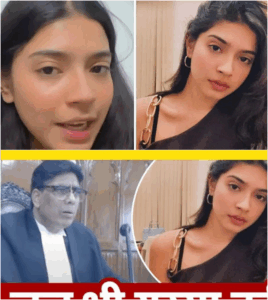A CONTROVERSIAL CASE: SHARMISHTA PANOLI, FREEDOM OF SPEECH, AND THE CALCUTTA HIGH COURT’S VERDICT
The Calcutta High Court, on Tuesday, delivered a stern message to Sharmishta Panoli, a young law student from Pune’s Symbiosis Law School, who found herself at the center of a heated controversy surrounding freedom of speech, religious sentiments, and social media. The court refused to grant her interim bail and reprimanded her for her actions, which it said had hurt the religious sentiments of a community. This case has sparked a nationwide debate on the limits of free speech in a diverse country like India and the responsibilities that come with it.
.
.
.

THE INCIDENT THAT SPARKED OUTRAGE
Sharmishta Panoli, a 22-year-old law student, became the subject of public and legal scrutiny after she posted a video and several posts on social media platforms Instagram and X (formerly Twitter) under the hashtag Operation Sindoor. These posts allegedly contained derogatory remarks about Islam and Prophet Muhammad, which quickly went viral, drawing sharp criticism from various quarters.
While the exact content of the posts was not disclosed in court, they were deemed highly offensive by many, leading to public outrage. Facing backlash, Sharmishta deleted the posts and issued an apology on X, stating that her intention was not to hurt anyone’s sentiments. However, the damage had already been done, and an FIR was registered against her on May 15, 2025, under sections related to blasphemy and promoting enmity between different groups. Two days later, on May 17, an arrest warrant was issued.
THE ARREST AND LEGAL BATTLE
Sharmishta’s troubles deepened when she allegedly evaded the police after being served a notice. According to the state’s public prosecutor, Sharmishta and her family fled to Gurugram to avoid arrest. The police eventually tracked her down and arrested her in Gurugram, where she was presented before a magistrate and remanded to three days of police custody. She was then brought to Kolkata, where the trial court ordered her to be placed in judicial custody for 14 days.
Sharmishta’s legal team challenged the trial court’s decision and filed a petition in the Calcutta High Court, seeking bail and contesting the legality of her arrest. Her lawyer argued that the charges against her were non-cognizable (not serious enough to warrant immediate arrest without prior notice) and that her arrest violated provisions of the Indian Constitution.
The state’s public prosecutor, however, refuted these claims, stating that proper notice had been served but was ignored by the accused. The prosecutor also emphasized that the trial court had already rejected Sharmishta’s bail plea, citing the seriousness of the allegations and the potential for public unrest.
CALCUTTA HIGH COURT’S REBUKE
Hearing the case, Justice Partha Sarathi Chatterjee of the Calcutta High Court delivered a sharp rebuke to Sharmishta. The court observed that her actions on social media had caused significant distress to certain communities and emphasized the importance of exercising caution in a diverse country like India.
“We have freedom of speech, but that does not give anyone the right to hurt others. Our country is home to people of various castes, religions, and communities. In such a setting, one must act responsibly and avoid making statements that could disturb social harmony,” the court remarked.
The judge further noted that the matter was sensitive and required careful handling. While setting the next hearing for a later date, the court refused to grant Sharmishta interim bail, stating, “The sky will not fall if we wait until the next hearing.”
THE DEBATE ON FREEDOM OF SPEECH
The case has reignited the ongoing debate about the limits of freedom of speech in India. Article 19(1)(a) of the Indian Constitution guarantees the right to freedom of speech and expression, but this right is not absolute. It comes with reasonable restrictions, including those related to public order, morality, and the sovereignty and integrity of the country.
Sharmishta’s case highlights the fine line between exercising free speech and inciting hatred or hurting religious sentiments. While her supporters argue that her arrest is an overreach and a violation of her constitutional rights, critics maintain that her actions were irresponsible and inflammatory, warranting strict legal action.
The court’s observations underscore the need for individuals to be mindful of their words, especially in the age of social media, where content spreads rapidly and can have far-reaching consequences. The case serves as a reminder that freedom of speech must be exercised with a sense of responsibility and respect for others.
PUBLIC AND INDUSTRY REACTIONS
The case has drawn widespread attention, with opinions divided across social, political, and legal circles. Supporters of Sharmishta, including some legal experts and free speech advocates, have criticized the court’s decision, calling it a setback for individual rights. They argue that her apology and the deletion of the posts should have been sufficient to resolve the matter.
On the other hand, many believe that such actions cannot be taken lightly, especially in a country as diverse as India, where religious sentiments run deep. Social media users have expressed mixed reactions, with hashtags like #JusticeForSharmishta and #RespectReligiousSentiments trending on different platforms.
Prominent legal scholar and activist Rajeev Menon commented, “This case is a litmus test for how we balance free speech with accountability. While Sharmishta’s actions were undoubtedly reckless, the response must be proportionate and within the bounds of law.”
WHAT’S NEXT FOR SHARMISHTA?
As Sharmishta remains in judicial custody, all eyes are now on the next hearing, which will be presented before the vacation bench of the Calcutta High Court. The outcome of this case will not only determine her immediate future but could also set a precedent for similar cases in the future.
For now, Sharmishta’s legal team is preparing to argue that her actions, though regrettable, do not warrant continued detention. They are also likely to challenge the procedural aspects of her arrest, including the alleged lack of proper notice.
Meanwhile, the state government is expected to push for stricter action, citing the potential for her posts to incite communal disharmony. The court’s decision will likely hinge on whether it views her actions as a genuine exercise of free speech or as a deliberate attempt to provoke and offend.
Play video:
CONCLUSION
The case of Sharmishta Panoli is a stark reminder of the power and responsibility that comes with freedom of speech. In an era where social media amplifies every voice, the need for caution and sensitivity has never been greater. While the legal battle continues, the case has already sparked important conversations about the boundaries of free expression and the role of the judiciary in safeguarding both individual rights and social harmony.
As the nation waits for the court’s final verdict, one thing is clear: this case will leave a lasting impact on the discourse surrounding free speech, accountability, and the law in India.
News
Missing PG Student Monica from Darbhanga CM College Found in Shocking Condition—Police Stunned
Missing Darbhanga CM College Student Monica Found Safe—Reveals She Left Home Willingly to Marry A week-long mystery surrounding the disappearance…
Chaos on the Kanwar Yatra: Devotees Go on Rampage, Vandalize Dhaba from Muzaffarnagar to Roorkee!
Kanwar Yatra Turns Violent: Kanwariyas Vandalize Dhabas from Muzaffarnagar to Roorkee Over Onion in Food A shocking wave of violence…
Uproar After Samajwadi Party Leader Sunil Yadav’s Death: Ex-MLA and Brother-in-Law Named in FIR!
Uproar in Sultanpur After Samajwadi Party Leader Sunil Yadav’s Mysterious Death: Former MLA and Brother-in-Law Named in FIR A wave…
Shocking Viral Video: Teacher Beats Student with Stick in Bihar School—Discipline or Violence?
Bihar School Turns Battleground: Viral Video Shows Teacher Beaten Brutally by Angry Parents—Discipline or Violence? A shocking video has taken…
Forced to Strip at Knifepoint: Obscenity in the Name of Jobs—What’s Happening in Uttar Pradesh?
Job Promise Turns Nightmare: Woman Forced to Undress at Knifepoint in Uttar Pradesh Official’s Quarters Uttar Pradesh: A shocking video…
UP Education Minister Injured in Road Accident as Convoy Cars Collide
UP Education Minister Gulab Devi Injured in Road Accident as Convoy Cars Collide Hapur, Uttar Pradesh: Uttar Pradesh’s Education Minister,…
End of content
No more pages to load












